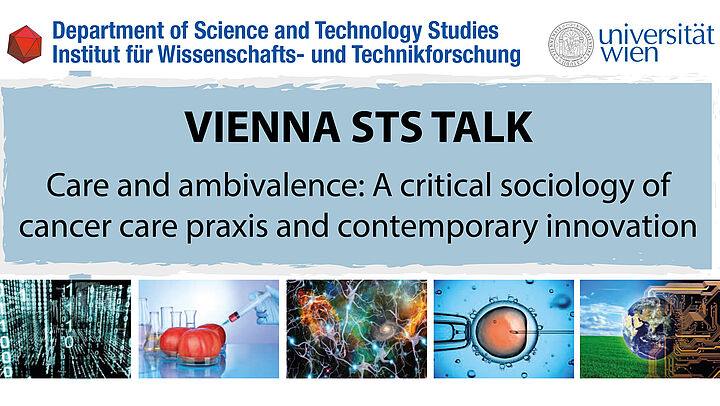Donnerstag, 17. Mai 2018, 18:00 - 19:30 iCal
Vienna STS Talk - Alex BROOM
Care and ambivalence: A critical sociology of cancer care praxis and contemporary innovation
Department of Science and Technology Studies / Seminar Room / Staircase II / 6th floor (NIG)
Universitätsstraße 7, 1010 Wien
Antrittsvorlesung, Public Lecture
This talk will draw on a program of research on the sociology of cancer, spanning 15 years, and involving fieldwork in Australia, India and the United Kingdom. In this talk I engage with two seemingly disconnected issues – the transition toward the end of life and the rise of precision therapeutics in oncology. It is here, I argue, that there lies a complex sociality – a highly politicised space – that articulates an important nexus between (collective) hope and (individualised) futility. Involving a wide variety of actors – patients, families, clinicians, scientists, big pharma, the state – these collective moments of ‘individualised’ care are ultimately ambivalent, if not highly contested spaces. In part this is because they raise important questions around (often concealed) desires, vulnerabilities, cultural taboos and the cultural festishisation of ‘innovation’. Here I argue for a greater emphasis to be placed on understanding innovation and futility from the perspective of the life worlds of individuals living with disease; a process that should underpin therapeutic development and investment and could be utilised to enable better care for people living with cancer (now and into the future).
Alex Broom is Professor of Sociology and Co-Director of the Practical Justice Initiative, Centre for Social Research in Health, The University of New South Wales (UNSW), Sydney. He is recognised as an international leader in the sociology of health and illness. His current focus is on developing critical analyses of the social dynamics of cancer and palliative care and the global challenge of antimicrobial resistance across contexts and cultures. He has published over 220 publications including 14 books, and his recent books include Dying: A Social Perspective on the End of Life (Routledge, 2015), Bodies and Suffering: Emotions and Relations of Care (Routledge 2017, with Ana Dragojlovic), and, Survivorship: A Sociology of Cancer in Everyday Life (Routledge, forthcoming). The substantive focus of his recent critical sociological work has been on empirically mapping and theorising cancer, chronicity, and the end of life, and has featured in high-profile journals such as The Sociological Review (2016, 2017), Sociology (2015), Social Science & Medicine (2013, 2017), Subjectivity (2017), Qualitative Health Research (2016, 2017) and Critical Public Health (2017). These publications have largely focused on the phenomenology of illness, healing and survivorship, and the complexity of care (whether curative, supportive or palliative). Responding to the Western-centricity of much previous sociological work on cancer, he also initiated a program of research on cancer in South Asia in 2005, and has since led studies on experiences of cancer care in India (e.g. Social Science & Medicine, 2009; Health, 2012, Qualitative Health Research, 2013, 2016; Critical Public Health, 2018), Sri Lanka (e.g. Public Health, 2010), and Pakistan (e.g. Qualitative Health Research, 2007), revealing the complex interplay of illness and cultural norms, structural violence, and tradition healing practices.
Zur Webseite der Veranstaltung
Veranstalter
Department of Science and Technology Studies
Kontakt
Corinna Wegscheider
Institut für Wissenschafts- und Technikforschung
+431427749602
sec.sts@univie.ac.at
Erstellt am Montag, 07. Mai 2018, 15:41
Letzte Änderung am Dienstag, 08. Mai 2018, 08:38

